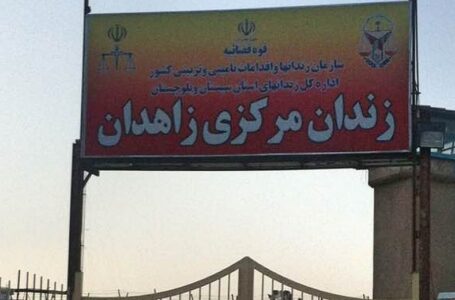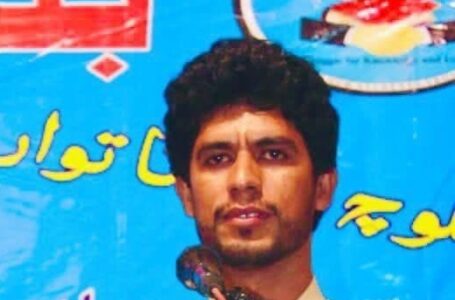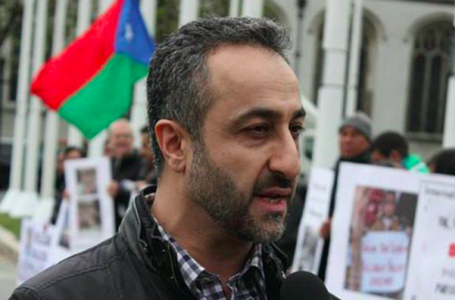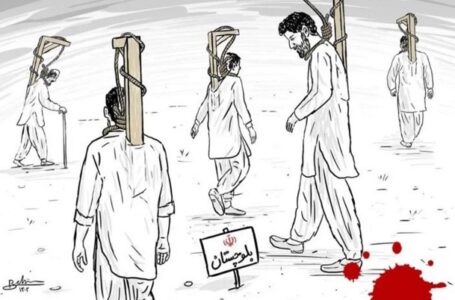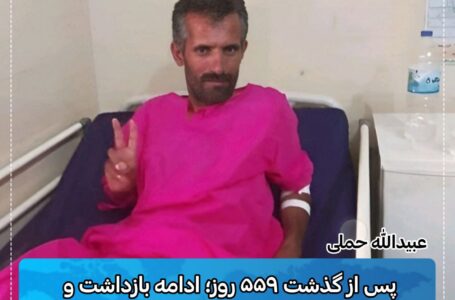In the Memory of My Teacher–Professor Saba Dashtyari
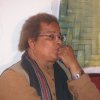
By Kambar Baloch, Australia
I’m writing this article in the memories I shared with this great teacher, philosopher, poet, writer, linguist, activist, socialist, nationalist and above all great human being – Professor Saba Dashtyari, shaheed.
As a young boy, I’ve heard fascinating stories from my cousins and friends about a Lyari born Baloch Professor who was an atheist but, ironically, thought Islamic studies and theology at University of Balochistan. Another thing that took my attention was he’s love and deviation for Balochi language, literature, culture, history and the desire to build and institutionalise Balochi language and culture for research purpose which eventually laid the foundation of first Balochi Library, Syed Zahoor Shah Hashmi Reference Library.
It was the mild winter of 2002 when my cousin Aamir and friend Alam introduced me to one of the greatest man I have ever met and shook hands with ; Professor Saba Dashtyari.
There was this tiny cafeteria located in Lyari where I first interacted with the Professor. As I entered the cafeteria my friend pointed at a man facing the wall, saying; Ustaad auda neshta (The ‘’Teacher’’ is sitting there). He was having a cup of tea and a newspaper beside him along with his brown threaded bag, hooked on the edge of the chair; I walked closer to him facing his back, looking at his curled whorl hairs with specs visible from behind. As I stood in front of him I had a feeling of meeting a clean shaven Saint sitting with a pen in his fist. I shook his hand and introduce myself:
Salaam Waja (Hello Sir), mani naam Kambar’e (My name is Kambar). He replied spontaneously: ‘’O bezaa’n tae naam Kambar’ee… Meer Kambar’e shayra zanee? (Oh so your name is Kambar, do you know the couplets on Mr Kambar?) Kambar is a famous heroic figure in western Baluchistan (Iranian Baluchistan) which dates back from 18th century; many poets and singers have written and sung verses for Mr Kambar.
I humbly replied Ji waja (Yes Sir) Man Zana (i know it) and I started to recite the verses just to show off that I know it:
‘’Meer kambar o sabze sagaar.. Zahma beja naama bedaar’’! (Great Kambar of an astonishing gesture… Swing the sword and prints your name in History)
He used to be very happy when his students recites Balochi poems and proverbs in a situation where Balochistan’s borders are occupied and both the Superior state, Iran and Pakistan, has imposed Farsi and Urdu languages in all means of life.
Professor Saba Dashtyari, mostly known for his contribution to progressive Balochi language and literature, was born as Ghulam Hussain in 1953 in Lyari district of Karachi and attained his education in the slums. He was highly influenced by Syed Zahoor Shah Hashmi, another late Baloch intellectual and linguistic. He obtained a master degree in Philosophy and Islamic studies. He was fluent in many languages including English, Farsi and Arabic. The Professor always believed in freedom of speech and expression.
His literary contributions include more than 24 books on Balochi literature, history, poetry and translations. He also established the Syed Zahoor Shah Hashmi reference library, Pakistan’s largest library on Balochi literature, in Malir area of Karachi. From 1996-2002 the Professor went on charity mission and travelled to Gulf Countries, Europe, and America requesting Baloch masses to join the cause in order to preserve our Balochi language and literature in a shape of library. You know what, he told me one day in a lighter humour ‘’I spend six years travelling in four different continents to collect nearly four to five hundred thousand rupees in order to start the library work and construction, but I could only collect Rs 250,000! Then he continued ‘’ If a mullah (priest) would have travelled for charity in the name of Masjid (Mosque) he would have received bigger amount of money in few months from your nation and elsewhere’’. But Waja Dashtyari was very much optimist and continued until finally he laid the foundation of first Balochi reference library. He funded the library with his own salary and spent on its development until his death.
Currently, the library houses more than 150,000 books in various languages on Balochi literature, culture and civilisation. Furthermore, he also compiled an index and bibliography of Balochi literature published in the past 50 years.
I remember once I went to visit him in Balochistan University, along with my cousin and a friend, back in 2003, he was lecturing a class on Islamic Philosophy. Three of us quietly entered his classroom and sat down. He was explaining the characteristic of Islamic states in the Khalifa era, the concept of charity, Zakat system, the actual phenomena of masjid, the rights of women and care of ageing people as mandatory duties in Islam etc, which took me to immense surprise to see the level of passion he did carried on his job, keeping aside his own believes. As the class ended we walked toward his apartment, I being sceptical to what I saw, impatiently raised a stupid question;
Waja (Sir), Shoma Islamiyat baaz shariye sara dar borta (You really have a good knowledge in Islamic studies). I say it was a stupid question because I knew that he had remained a lecturer of Islamic studies and philosophy for past 30 years.
The Professor very charmingly said ‘’Aday bechaa Elm’e Zaanag dege gapp’e O Elm’e Mannag dege chiss ze ‘’ (Acquiring knowledge on a particular thing doesn’t necessary means you have to believe in it as a sole truth). I just loved the way Saba spoke Balochi. The tone, the style and variant he had while speaking sounded like a hymn to my ears. Then we sat at his apartments for an hour where you could see medium size posters of Gandhi and Syed Hashmi next to each other on the wall, numerous numbers of audio cassettes in his cupboard, mostly those of Mohd Rafi Saab’s and when I expressed my favouritism to Rafi, he smiled and said:
‘’Achaa guda to haa choo borzee surr’ey goshdaaroke haa’’ (So you also prefer the high pitch singers ha) I smiled and replied ‘’Jii Waja’’ (Yes Sir).
Saba was astonishingly brave with a charismatic personality. He was an ardent reader and one who purely understands the philosophy of democracy, liberalism and nationalism. He drew more of his respect as being one of the most versatile teachers who has mastered in many field of life. If he speaks on history it means he have mastered the science of it, if he spoke on politics or philosophy then he would cite several books to support his arguments.
One of Balochistan University student- turned- journalist, Malik Siraj, has rightly argued in his recent article that ‘’Saba ran kind of a (liberal) university within the (strictly controlled) university’’.
I completely indorse to Malik wrote. “Often students would sit beside him and hear him for hours. He was in all sense a Balochi Encyclopaedia; he carried an Academic account in himself. He could speak and debate on any topic be it religion, politics, philosophy, history, linguistic, science. As a keen learner I’ve always listened and admire what he said about literate Balochi words, adjectives and the style. He’d always increased my interest and knowledge for the language. He was the gravity of attention among the scholars, teachers, and students and activist where ever he went.
The best time for me to see more of Waja Dashtyari was in the summer of 2007, when I arrive to Karachi from Australia on a family visit. He had an amazing sense of humour. I met him at a friend’s place. Where I saw him first after long time.
Saba had a very unique style of hand-shakes. He will shake your hand and bring the dorsal surface of your hand to his cheeks – merely showing love and care to his students in his own way. Once we were walking from Jatpat market towards chankiwara in Lyari district (Karachi) with Waja Dashtyari, my friend Alam praised him by saying ‘’ Waja, Khuda bika to sadd saal’a gesh zindag bebaye ‘’ (I pray you would live more than 100 years, God willing) he looked at him enigmatically and replied ‘’Bachaa sadda che shartar guda hazaar-i beka‘’ (Why don’t you make it for thousand years instead of one hundred). We laughed, knowing he least bothered in the quantity of life.
Those were the days where I frequently met him at Syed Hashmi reference Library, at friends place and also got chance to invite him at my home. He was very busy in library’s work as his comrade friend, Hameed Baloch, arrived from Canada. I recall one of meeting at a friend’s place in Lyari where Saba was invited for dinner; he spoke about the atrocities of Pakistani state in Balochistan and on Baloch nation, the systematic genocide of Baloch culture, language and people. He spoke about the need of unity within the political parties and civil societies, irrespectively whether in or out of the country. He strongly emphasized on education, especially on women education. He believed that even a revolutionary struggle needs to be pursuing through an academic progressive way in order to understand the basic right of the deprived people. Writers, Poets and Teachers must be highly educated to give appropriate guidance and awareness to society through means of education in order to tackle the enemy on multiple plat forms, although no struggle is completed without shedding blood, said the Professor.
Most of his debates with my circle of friends were on the principles of nationalism and the philosophy of language. ‘’Language’’ he says; is a uniquely human gift and to preserve ones mother language is every individual’s responsibility. He quoted Syed Zahoor Hashmi, Karl Marx, Bertrand Russell and many more free thinkers while talking. Here I would like to share an interesting sight of Waja Dashtyari which left kind of an imprint in my mind and the way I see things i.e. the understanding of words in different languages to those of one’s mother language. I remember discussing with him the impact of language in society and the process of mind in taking the exact meaning of words as we see or hear them to a different level. He beautifully compounded the philosophy of Freud’s concept of ‘conscious versus unconscious mind’ to that of Wittgenstein’s ‘‘ordinary language philosophy’’ theory, in order to strengthen the argument that language has so much to do with practical science and social science than just mere conversation.
What I’ve understood from him and later reading other philosophers work is that ‘’Language is an independent creature which has its own roots in past, but our future is based on it’’. It’s because we think in our mother language. It is now learnt through neuroscience studies that people who speak different languages do indeed think differently. I think in my Balochi language. I see things in my language. In my eyes, the colour of my hair is ‘’Siya’ah’’ and not ‘’Black’’. There is a difference. Saba insisted that one can learn as many languages but should always ‘’study’’ in his/her native language. There is a difference between learning and studying in that language. Unfortunately, we Baloch don’t have any basic education system where Balochi is studied in primary and high schools.
Waja Saba Dashtyari was a firm believer in peace and democracy. He was a very humble person. He never married, instead spent all his life working and promoting Balochi language. He was a man of a strong soul and an honest person. Syed Hashmi goshi ‘’ Raastiye baama johar ka dataa.. Mulk sho maal o methak sarr shoo. (Syed says; If one doesn’t stand at the side of truth then nothing would remain, everything will vanish) said the Professor. He always urged us to speak the truth no matter how bitter it is.
He expressed his grievances towards the Baloch political parties and the elite class of the society for not helping in promoting the cause of Balochi language. He once said ‘’Balochi language is an Ocean; the more you dig the more pearl you are able to discover. It is immensely rich in vocabulary and grammar.’’ Saba’s future plan was to expand the space of library, in building more storeys and dreamt of giving this Academy a status of ‘’National Institute of Balochiology ‘’.
My last conversation with Waja Dashtyari happen to be a month ago on phone, where he spoke about library’s work and the books that I was supposed to courier him. I never thought in my wildest dream that it will be my last conversation with him. He knew the threats he had but never hesitated to speak freely. I have always requested him to maintain his focus in Balochi literature and language as he was one of the greatest, probably the greatest, prominent Baloch linguist I knew which was an asset to Balochistan Waja Saba Dashtyari was an intellectual, a teacher, a historian, a philosopher, a liberal, a free thinker, and a self-made man. Empowered by education and wisdom. He was not a son of Sardar or Nawab but an extraordinary man from a lower middle class background who stood against the might of the state in all form. He staged rallies, protest, attended seminars and fearlessly oppose to the genocide of Baloch population. Saba is our hero, the voice of voiceless, echoed from the slums of Karachi to the cities of Balochistan and across the oceans. In past 30 years Saba inspired thousands of students in Karachi, Quetta and rest of Balochistan. He’s legacy will remain from generation to generation as a Martyred Professor.
Many thanks to Balochi Linguist for preserving this article.

